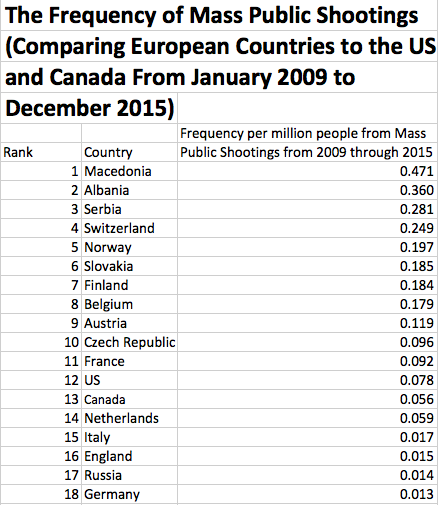President Obama addressed the nation Sunday night from the Oval Office on the threat of terrorism and America’s response in light of last week’s atrocity in San Bernardino, California. The speech was . . . not good. Clichéd. Condescending. Utterly uninspired and uninspiring.
And that’s not all.
Marc A. Thiessen, Washington Post: “Usually when a president delivers a prime-time address to the nation, he has something new to announce — like, say, a new military strategy. Not President Obama. Like a notorious Christmas ‘re-gifter,’ Obama did nothing more Sunday night than repackage his old, failing strategy in the shiny wrapping of tougher language.”
Jim Geraghty, National Review Online: “At this point in his presidency, Obama speaks with only one tone, the slightly exasperated and sometimes not-merely-slightly exasperated ‘adult in the room’ who constantly has to correct his fellow Americans, who are always flying off the handle, calling for options that ‘aren’t who we are,’ betraying our values, and so on. He’s always so disappointed in us.”
George Condon, National Journal: “His low point may have come when he insisted on veering into gun control. If the point of the speech was to unite the country and bring an anxious nation together, bringing up one of the most divisive domestic political issues is not a great way to do that—particularly when the administration has struggled to explain how the usual items on their gun agenda such as gun-show restrictions and better background checks would have made any difference in San Bernardino.”
The president’s venture into the gun control debate was particularly inept when he took up the cause of barring people on the U.S. no-fly list from buying guns. “To begin with,” he said. “Congress should act to make sure no one on a no-fly list is able to buy a gun. What could possibly be the argument for allowing a terrorist suspect to buy a semiautomatic weapon?”
There are at least two arguments. First, the no-fly list is rife with error and devoid of transparency — which is why the ACLU sued in 2010. Among those on the list: a 4-year-old child, Stephen Hayes of the Weekly Standard, Ted Kennedy, and at least 72 Department of Homeland Security employees. (Incidentally, Kennedy managed to get himself off the list — no easy feat.)
Second, there is the nontrivial matter of due process of law. The U.S. Senate last week rejected an amendment by Sen. Dianne Feinstein (D-Calif.) that would have empowered the federal government to bar a person from buying a gun if “the Attorney General . . . determines that the [buyer] is known (or appropriately suspected)” to have been involved in terrorism-related conduct “or providing material support support or resources for terrorism,” and “if the Attorney General ‘has a reasonable belief that the [buyer] may use a firearm in connection with terrorism.’”
“Can a person be denied constitutional rights, not based on a past criminal conviction or even a restraining order issued in court under a ‘preponderance of the evidence’ standard, but based just on the government’s suspicion?” UCLA Law professor Eugene Volokh asks and offers an answer at the Volokh Conspiracy:
I can’t see how that’s constitutional. And though the bill would have let the buyer go to court to challenge the attorney general’s decision, the attorney general would simply have had to show by a preponderance of the evidence that the two elements were satisfied — that the attorney general appropriately suspected the buyer and that she had a reasonable belief about what the buyer may do. Plus the evidence supporting the attorney general’s position might never be shared with the buyer, which may make it impossible for the buyer to fairly challenge it, or aired in open court. . . .
But the problem would be even more serious when we’re dealing with the denial of an explicitly guaranteed constitutional right, and not just the denial of the admittedly very important ability to fly on airplanes. If you have a constitutional right to do something, the government has to do more than just provide the attorney general’s suspicion and speculation as a basis for denying you that right. This isn’t a supposedly modest, limited gun control measure. It cuts to the heart of the constitutional right itself.
The president and congressional Democrats are demagoguing this question. They haven’t been able to achieve the sort of “common sense” gun control they’ve long sought through conventional political means — good, old-fashioned persuasion — so they’re left to exploit a terrorist attack in order to subvert the Constitution. Again. “What could possibly be the argument”? Constitutional rights shouldn’t be subject to the whims and caprices of a craven political class, that’s what.




![As you know, there are many different issues on which Congress and the president can focus their time and attention. Please tell me if you think, at this time, Congress and the president should make each of the following a top priority, a high priority, a medium priority, a low priority, or not a priority at all. How about -- [RANDOM ORDER]? May 2013 results](http://sas-origin.onstreammedia.com/origin/gallupinc/GallupSpaces/Production/Cms/POLL/8krgeos2qkmgtv41jszqpw.gif)

 CFIF Freedom Line Blog RSS Feed
CFIF Freedom Line Blog RSS Feed CFIF on Twitter
CFIF on Twitter CFIF on YouTube
CFIF on YouTube